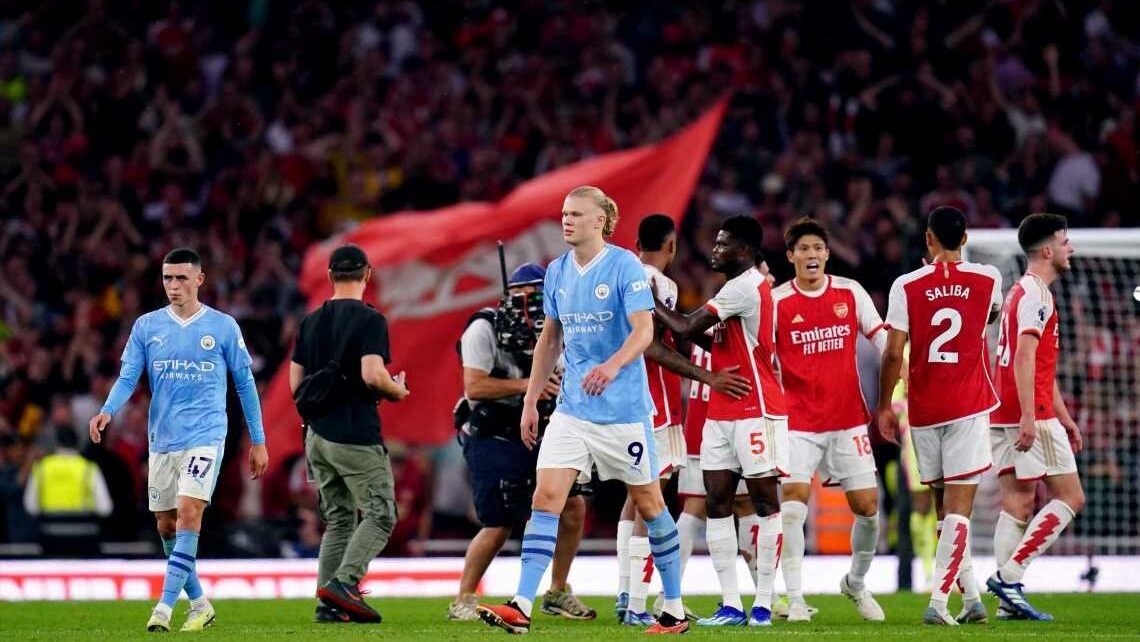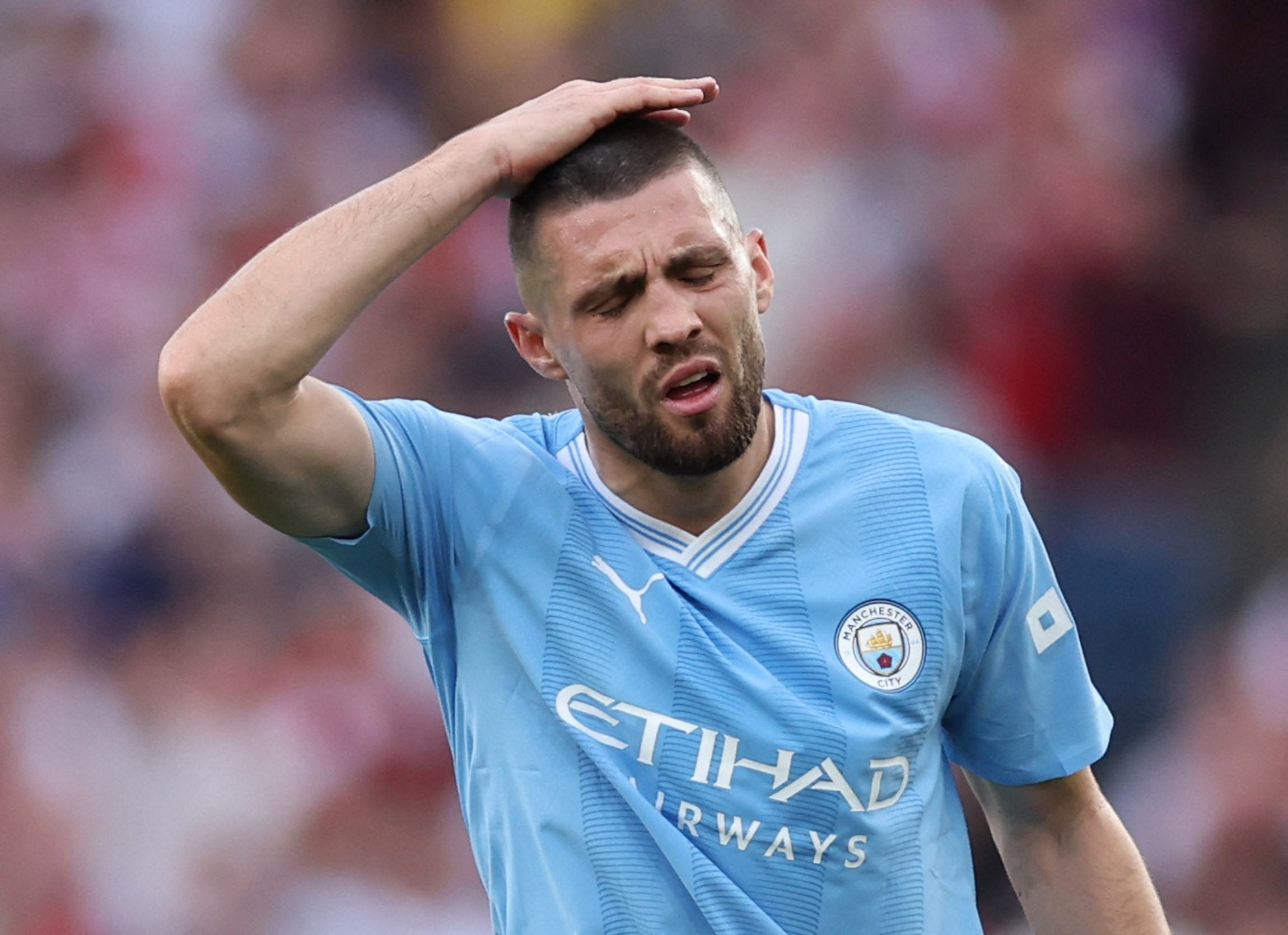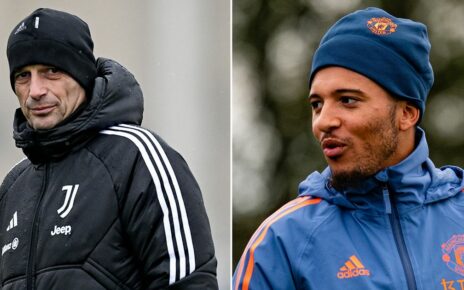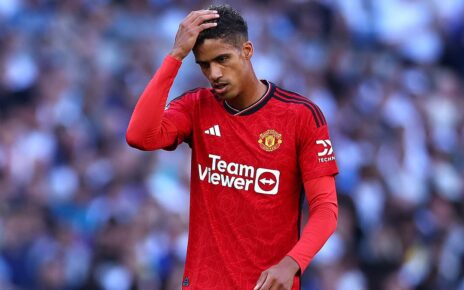Arsenal players celebrate at the end of the win against Manchester City (John Walton/PA)
Sign up to Miguel Delaney’s Reading the Game newsletter sent straight to your inbox for free
Sign up to Miguel’s Delaney’s free weekly newsletter
Thanks for signing up to the
Football email
The times when Nottingham Forest influenced title races may not be confined to the reign of Brian Clough. Morgan Gibbs-White was the agent provocateur who advantaged Arsenal: perhaps Tottenham and Liverpool, in the broader picture, too. And definitely Newcastle in the Carabao Cup and Wolves in the Premier League. When Rodri grabbed the Forest midfielder around the neck and was sent off, Manchester City went from the 100 percenters to the side on their longest losing run since 2018.
And if that is only two league games, a season has been reshaped by a suspension. One quadruple has already eluded City, falling at the first hurdle in the Carabao Cup. Another had an air of inevitability; now City, third in the table, have been downgraded and are merely favourites in the Premier League. “No team has ever won four in a row,” reasoned Pep Guardiola; defeat to Arsenal shows it will be no procession for City to make history. “It is not the first time we are behind,” their manager added. They can play catch-up.
But Rodri’s absence has exposed fault-lines in his squad. The most obvious is the failure of Kalvin Phillips’ move to Manchester and the indispensability of the man Guardiola believes could be the best holding midfielder in the world. City have lost all three matches for which he has been banned. “That is a stat we cannot deny,” Guardiola said. Rodri is the Etihad Invincible, his teammates looking more beatable in his absence.
That City only scored one goal in 314 minutes of domestic football since Rodri saw red highlights that, among his many other strengths, the metronome in midfield is a growing attacking influence. Only two players have more league goals for City this season; none have more shot-creating actions or passes into the final third.
The Rodri reshuffle meant Bernardo Silva patrolled the area in front of the back four at the Emirates Stadium, with typical intelligence and assurance in possession, while Rico Lewis was pressed into service as a quasi No 10, at times almost forming a little-and-large attacking double act with Erling Haaland. Guardiola used to deploy a precocious prodigy as a No 10, but it was Lionel Messi, not Lewis; the Argentinian’s 830 career goals are 829 more than the Englishman’s tally. But Lewis was part of a one-game strategy. Everything revolved around replacing Rodri. “I wanted to put more protection on the ball,” said Guardiola, explaining why Jack Grealish was benched and Julian Alvarez shifted into a wider role.
Three players began in the anchor role during Rodri’s unwanted sabbatical: Phillips at Newcastle, Mateo Kovacic at Wolves, Silva at Arsenal. Various central-midfield combinations have also included Lewis and Matheus Nunes. “We had a plan today but we didn’t win,” Guardiola said succinctly on Sunday. He has been improvising, which comes naturally to a manager with a famous propensity for overthinking, but also compromising, something he rarely had to do last season when he boasted the most enviable midfield options in Europe.
Mateo Kovacic has been deployed in midfield
Different as each is, there is a case for arguing that, such was Rodri’s vast contribution that the void his absence created was the first time they really missed Ilkay Gundogan and Kevin de Bruyne. And not merely because the German became the specialist on the major occasions, the big-game scorer. He also made passing look easy, and City have been less fluent at times this season.
Minus De Bruyne, they have been less creative. And if it is unfair to expect anyone – let alone the rookie Lewis – to possess his astonishing range of passing and if Alvarez has perhaps exceeded expectations as his deputy, the Argentinian is less of a playmaker. And, meticulously as Guardiola can plan, De Bruyne possesses the invaluable ability to make something happen out of nothing.
It was what they required against Arsenal. Last season, De Bruyne proved the Gunners’ kryptonite. In twin tours de force, he delivered three goals and two assists over 180 minutes in which, for all Haaland’s goals, he staked a claim to be the player who decided the destination of the trophy.
Now Arsenal found it easier to defend against a City team deprived of De Bruyne. They were more predictable, more prosaic. City were limited to just four shots; it was the fewest in Guardiola’s 274 Premier League games as a manager. They had a mere seven against Fulham, albeit in a match when Haaland scored three and City five. And if there are other occasions where they have been rampant, the fact is that they have had fewer shots, and have a lower expected goals, than Everton this season.
The muscularity of Haaland, Alvarez and Rodri may have offered alternatives to the creativity of De Bruyne and Gundogan, but there are points when City required invention. And even as Rodri returns, it may be with a cautionary note: with De Bruyne sidelined, a relatively slender squad may only be an injury or two to a pillar of the side away from looking fallible again.
But if successive league defeats has such a rarity that it last happened in 2018, City recovered to register 98 points that season. The warning from the past is for everyone else. But the warning from the last three games is that City struggle without Rodri. And while he returns now, they have another two months to navigate without De Bruyne.
Source: Read Full Article





